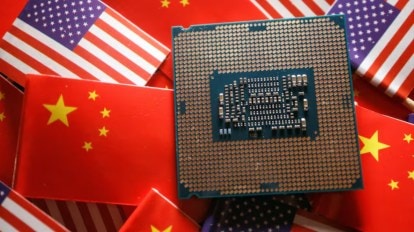The United States began its third crackdown on China’s semiconductor sector in three years on Monday, limiting shipments to 140 businesses, including Naura Technology Group, a manufacturer of chip equipment, among other actions.
The package, which also targets exports of advanced memory chips and more chipmaking tools to China, also imposes new export restrictions on Chinese chip toolmakers Piotech, ACM Research, and SiCarrier Technology in an attempt to stifle Beijing’s chipmaking aspirations.
The action is one of the final significant attempts by the Biden administration to prevent China from obtaining and manufacturing semiconductors that may contribute to the development of artificial intelligence for military use or pose a danger to American national security in any other way.

It occurs only a few weeks before Donald Trump, the president-elect, is sworn in. Trump is anticipated to keep many of Biden’s tough-on-China policies.
The package includes new export restrictions on chipmaking equipment manufactured in Singapore and Malaysia, new restrictions on 24 additional chipmaking tools and three software tools, and restrictions on shipments of high-bandwidth memory chips, which are essential for high-end applications like AI training, that are headed to China.
The measure is intended to stop “China from advancing its domestic semiconductor manufacturing system, which it will use to support its military modernization,” according to Commerce Secretary Gina Raimondo.
The plan’s main elements and the number of participating firms were initially published by Reuters.
Lam Research, KLA, and Applied Materials, as well as foreign businesses like Dutch equipment manufacturer ASM International, will probably suffer from the tool restrictions. Nearly two dozen semiconductor companies, two investment firms, and more than 100 chipmaking tool manufacturers are among the Chinese businesses subject to the new limitations.
These businesses collaborate with Huawei Technologies of China and include Swaysure Technology Co., Si’En Qingdao, and Shenzhen Pensun Technology Co. Now at the forefront of China’s sophisticated chip development and production, the leader in telecom equipment has been hampered by U.S. sanctions.
In order to prevent U.S. vendors from exporting to them without first obtaining a special authorization, they will be added to the entity list.
When questioned about the U.S. restrictions, Lin Jian, a spokeswoman for the Chinese foreign ministry, said that such actions disrupted global supply chains and threatened the world economic trade system.
At a routine press briefing on Monday, he continued, China would take steps to protect the rights and interests of its companies.
Following the announcement of the additional limitations, China’s commerce ministry posted a statement on its official website describing the U.S. restrictions as a blatant instance of “economic coercion” and “non-market practices.”
Since the United States and other nations have limited exports of the sophisticated chips and the equipment needed to produce them, China has intensified its efforts to become self-sufficient in the semiconductor industry. However, it still lags years behind industry heavyweights like ASML in the Netherlands and Nvidia in AI processors.
Additionally, the United States is about to impose more limitations on China’s largest contract chip maker, Semiconductor Manufacturing International Co., which was included on the Entity List in 2020 but had a policy that permitted the granting of licenses worth billions of dollars to transport goods to it.
Three firms that invest in semiconductors will be included to the U.S. entity list for the first time. Because of their role “in aiding China’s government’s efforts to acquire entities with sensitive semiconductor manufacturing capability critical to the defense industrial bases of the United States and its allies with the objective of relocating these entities to China,” the department added Chinese private equity firm Wise Road Capital, tech firm Wingtech Technology Co., and JAC Capital.
Typically, businesses who apply for permits to ship to companies on the Entity List are turned down.
An part of the new package that addresses the foreign direct product restriction might damage certain U.S. allies by restricting what their firms can send to China.
The new regulation will give the United States more authority to restrict the export of chipmaking equipment to specific chip facilities in China from American, Japanese, and Dutch producers located elsewhere in the world.
The restriction applies to equipment manufactured in Israel, Malaysia, Singapore, South Korea, and Taiwan, however it does not apply to equipment built in Japan or the Netherlands.
16 businesses on the entity list that are thought to be crucial to China’s most ambitious chipmaking goals will be subject to the enhanced foreign direct product rule.
Additionally, the regulation would completely eliminate the U.S. content threshold that establishes when certain foreign goods fall under U.S. jurisdiction. This will enable the United States to control any product that is delivered from outside to China if it contains any chips made in the United States.
After extensive negotiations with Japan and the Netherlands, which together with the US dominate the development of sophisticated chipmaking equipment, the new regulations are now being revealed.
The Dutch government stated that it will research the new limitations, noting that “every country has its own considerations” about export controls and national security.
Although ASML stated on its website that it did not see a significant impact on its operations, it did note that exports of some of its chip-making tools would be impacted if the Dutch government undertakes a “similar security assessment.”
The most recent regulations are the third significant set of export restrictions on chips that the Biden administration has enacted.
The United States announced a broad set of regulations on the production and sale of specific high-end chips in October 2022, which was seen as the largest change to its tech policy against China since the 1990s.





